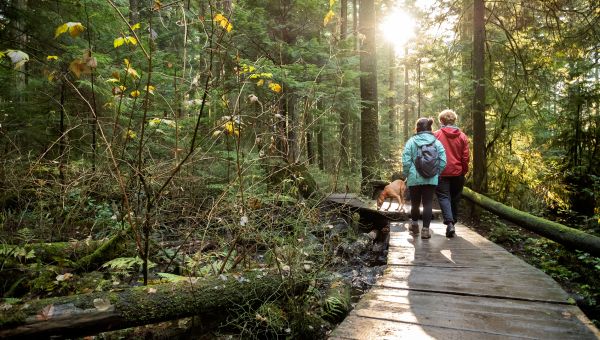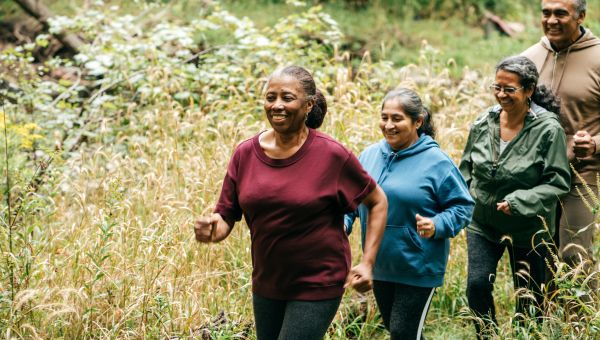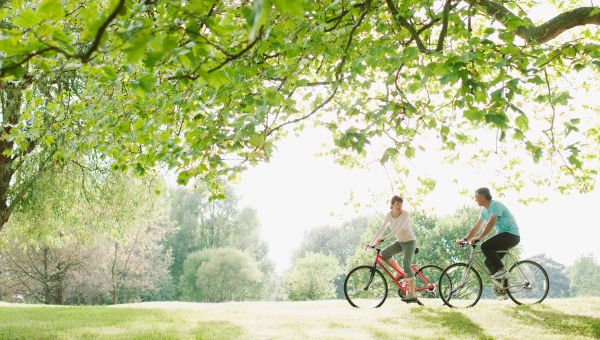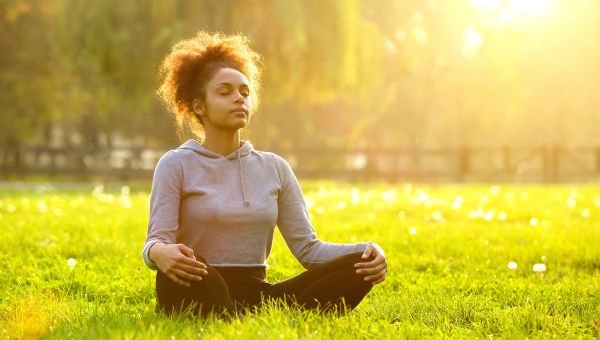5 Ways Nature Keeps You Healthy, According to Research
The great outdoors is great for your health.
Updated on February 10, 2023

Poet and essayist Ralph Waldo Emerson believed nature was good for the soul: “The happiest man is he who learns from nature the lesson of worship.” But spending time outdoors is also good for the body and mind, in a number of different ways. From your disease risk to your mental well-being, here’s how visiting parks and other green spaces can influence your health.

Lower rates of obesity
Some research suggests that access to parks is associated with a lower obesity rate. A 2021 study published in the Journal of Preventive Medicine and Public Health found as much, linking green space to decreased obesity in communities. And in a 2020 review and meta-analysis of studies in the journal Obesity, more than half of the research examined found a link between more green space and less obesity.

Decreased diabetes
Park access is also correlated with lower rates of type 2 diabetes. In a 2021 review published in the International Journal of Environmental Research and Public Health, scientists found that exposure to neighborhood green spaces was linked to a decreased risk of the condition.
Scientists have also been studying just how much green space is needed in a neighborhood to make a real difference. One study, also from 2021 and published in the same journal, found that the risk for diabetes dropped significantly when green space made up 30 to 40 percent of a person’s nearby area—within 1.2 miles from home.

Less heart disease
Communities with more parks may have lower rates of heart attacks and high blood pressure, as well. A 2022 review of studies published in the journal Environmental Pollution looked at data gathered from 18 countries and over 100 million people. The researchers found that just a small 0.1 percent increase in green space was associated with 2 to 3 percent lower odds of having a stroke. Not only that, they found that the odds of dying from a stroke or heart disease was also lower by 2 to 3 percent.

Better focus and attention
Even short-term exposure to nature may improve your focus, suggests one 2022 study published in the International Journal of Environmental Research and Public Health. Researchers found that after just one lesson taught in a garden rather than a classroom, second- and third-grade children were more focused and performed better in math calculations.
You may not even need access to actual nature to get the benefits. Something as simple as changing your desktop background image might make a difference. Authors of another 2022 study in the same journal gave participants cognitive tasks that wore out their working memory, a type of attention that you use to manage your short-term memory. When these worn-out participants then looked at digital images of nature scenery, they performed better on tests than if they were shown pictures of urban scenes.

Improved mental health
Nature can boost your mood, too. In a 2020 review published in the International Journal of Environmental Research and Public Health, researchers found that being exposed to a forest was associated with positive mental well-being. The data they reviewed also suggested that being in a forest can actually lower stress levels.
And while more research on children and teenagers is needed, engaging with nature may also benefit kids’ mental health, according to a 2018 review published in the Journal of Epidemiology and Community Health. It’s just another good reason to take the whole family for a walk in the woods.

Emerson, Ralph Waldo. The complete works of Ralph Waldo Emerson: Nature addresses and lectures [Vol. 1]. Nature: VII Spirit. University of Michigan Digital Library. Last updated March 28, 2006.
Kim J, Lee S, Ramos W. Investigating the Relationship Between Accessibility of Green Space and Adult Obesity Rates: A Secondary Data Analysis in the United States. J Prev Med Public Health. 2021;54(3):208-217.
YN Luo, WZ Huang, et al. Greenspace with overweight and obesity: A systematic review and meta‐analysis of epidemiological studies up to 2020. Obesity. Published online July 16, 2020.
De la Fuente F, Saldías MA, Cubillos C, et al. Green Space Exposure Association with Type 2 Diabetes Mellitus, Physical Activity, and Obesity: A Systematic Review. International Journal of Environmental Research and Public Health. 2021;18(1):97.
Mazumdar S, Chong S, Astell-Burt T, et al. Which Green Space Metric Best Predicts a Lowered Odds of Type 2 Diabetes? International Journal of Environmental Research and Public Health. 2021;18(8):4088.
Liu XX, Ma XL, Huang WZ, et al. Green space and cardiovascular disease: A systematic review with meta-analysis. Environ Pollut. 2022;301:118990.
Mason L, Manzione L, Ronconi A, et al. Lessons in a Green School Environment and in the Classroom: Effects on Students' Cognitive Functioning and Affect. Int J Environ Res Public Health. 2022;19(24):16823.
van Oordt M, Ouwehand K, Paas F. Restorative Effects of Observing Natural and Urban Scenery after Working Memory Depletion. Int J Environ Res Public Health. 2022;20(1):188. Published 2022 Dec 23.
Cowan N. What are the differences between long-term, short-term, and working memory? Prog Brain Res. 2008;169:323-338.
JM Smith, LB Alloy. A roadmap to rumination: a review of the definition, assessment, and conceptualization of this multifaceted construct. Clinical Psychology Review. 2008;29(2):116–128.
K Riihimaki, M Vuorilehto. Rumination and primary care depression. European Psychiatry. 2016;33:S422.
Grilli G, Sacchelli S. Health Benefits Derived from Forest: A Review. Int J Environ Res Public Health. 2020;17(17):6125.
S Tillmann, D Tobin, et al. Mental health benefits of interactions with nature in children and teenagers: a systematic review. Journal of Epidemiology and Community Health. October 2018;72(10):958-966.
More On


video

article

slideshow


video


video
